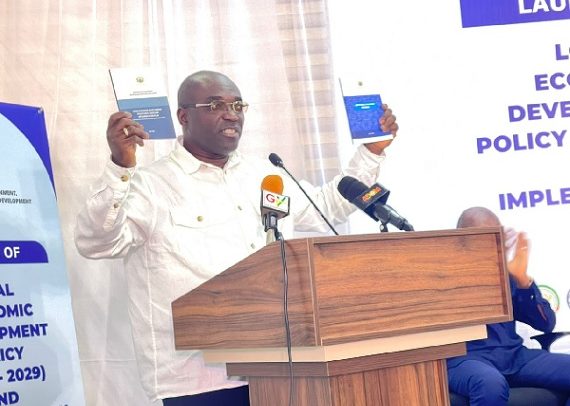Martin Adjei-Mensah Korsah
Minister for Local Government, Decentralisation and Rural Development, Martin Adjei-Mensah Korsah, has launched the Revised Local Economic Development (LED) Policy (2024-2029) and Implementation Plan.
The revised policy seeks to enhance local economic development across the country, empowering communities and improving livelihoods.
Mr. Adjei-Mensah Korsah, said the launch of the policy ties perfectly with Section 12(1)(b) of the Local Government Act, 2016 (Act 936) which enjoins all Metropolitan, Municipal and District Assemblies (MMDAs) to promote local economic development.
According to him, the revised LED Policy (2024-2029) has emerged globally and has over the years been regarded as a key function of local governments that creates an enabling environment to efficiently harness and utilise local resources for economic growth.
He revealed that Ghana, like other countries, signed onto the United Nations Sustainable Development Goals (SDGs) 8, which focuses on promoting development-oriented policies that support productive activities, decent job creation, entrepreneurship and encouraging the formalisation and growth of micro-small-and medium-sized enterprises.
Chapter 20 of the 1992 Constitution, Article 240(1), he said, stipulates that “Ghana shall have a system of local government and administration which shall, as far as practicable, be decentralised.”
He added that, the section of the constitution designates MMDAs as the highest political, administrative and executive authorities at the district level.
The minister stated that, the Local Government Act, 2016 (Act 936) mandates the MMDAs to promote and support productive activities and social development as well as remove all obstacles to local government.
The Local Government’s Act, according to him, also mandates the MMDAs to formulate and execute plans, programmes and develop strategies for the effective mobilisation of resources for local government.
Highlighting on the achievements of the implementations of LED, he disclosed that, the ministry has delivered a total of 46 urban markets between 2019 and 2023 under the Ghana Secondary Cities Support Project which are all at various stages of completion.
“The 2024 LED Policy and Implementation Plan will present the opportunity for us to build on the success of the 2020 policy and address the gaps,” he said.
“The policy goal is to promote a conducive environment at the district level for sustained local business growth, decent employment opportunities and economic empowerment for all Ghanaians and also, the policy identifies eight objectives, 29 strategies and 124 activities for implementation from 2024 to 2029,” he added.
He emphasised that, the ministry has reviewed the practitioners’ manual which provides a step-by-step approach to LED implementations for MMDAs and practitioners.
“It is my ardent hope that this LED Policy will be streamlined and implemented by all stakeholders, especially MMDAs to create economic opportunities to reduce poverty and promote inclusive growth,” he mentioned.
By Janet Odei Amponsah


